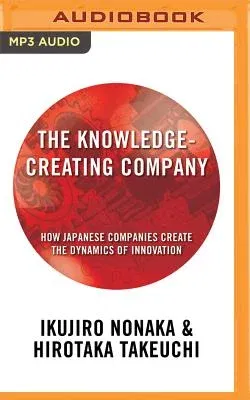How have Japanese companies become world leaders in the automotive and
electronics industries, among others? What is the secret of their
success? Two leading Japanese business experts, Ikujiro Nonaka and
Hirotaka Takeuchi, are the first to tie the success of Japanese
companies to their ability to create new knowledge and use it to produce
successful products and technologies.
In The Knowledge-Creating Company, Nonaka and Takeuchi provide an
inside look at how Japanese companies go about creating this new
knowledge organizationally.
The authors point out that there are two types of knowledge: explicit
knowledge, contained in manuals and procedures, and tacit knowledge,
learned only by experience, and communicated only indirectly, through
metaphor and analogy. U.S. managers focus on explicit knowledge. The
Japanese, on the other hand, focus on tacit knowledge. And this, the
authors argue, is the key to their success--the Japanese have learned
how to transform tacit into explicit knowledge.
To explain how this is done--and illuminate Japanese business practices
as they do so--the authors range from Greek philosophy to Zen Buddhism,
from classical economists to modern management gurus, illustrating the
theory of organizational knowledge creation with case studies drawn from
such firms as Honda, Canon, Matsushita, NEC, Nissan, 3M, GE, and even
the U.S. Marines. For instance, using Matsushita's development of the
Home Bakery (the world's first fully automated bread-baking machine for
home use), they show how tacit knowledge can be converted to explicit
knowledge: when the designers couldn't perfect the dough kneading
mechanism, a software programmer apprenticed herself with the master
baker at Osaka International Hotel, gained a tacit understanding of
kneading, and then conveyed this information to the engineers.

